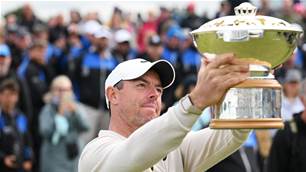Golf is an easy game to fall in love with. The pursuit of a purely struck shot; the ability of all to compete on a level playing field; the joy of a walk outdoors with friends. It has a lot to recommend it.
But for all its up sides, golf is also seemingly easy to dislike.
The anti-golf crowd focusing in on exclusivity, the significant use of resources to allow a pastime of few and much more. Issues that golf mostly, particularly the public game, aren’t guilty of, in fact quite the opposite.
And while I doubt my own love for the game will ever wane, increasingly the reasons for dislike are easier to understand when getting a full view of golf’s unpleasant underbelly that most often rears its head on social media.
A Twitter post including a similar image to the one above from golf writer Eamon Lynch on Monday sparked this deeper refelction of these feelings. Not Lynch’s post itself, mind, but the responses to it.
“Gestures matter: The new Champion Golfer of the Year is also an advocate for inclusion in this sport. This was his yardage book cover at the Memorial Tournament last month,” Lynch wrote.
The replies were – unfortunately – predictable and disheartening, to say the least.
Among them were to keep politics out of golf, misuse of language referring to the sexuality and attempts to make jokes about the reason one of the best players in the world chose to use a pride flag yardage book cover. (The covers were a sponsor gift to players, but with no obligation to use it.)
Gestures matter: The new Champion Golfer of the Year is also an advocate for inclusion in this sport. This was his yardage book cover at the Memorial Tournament last month. 👏 pic.twitter.com/fluuXWBcGs
— Eamon Lynch (@eamonlynch) July 18, 2021
But worst of all were the comments that for, lack of a better term, ‘mansplained’ to Lynch why gestures don’t matter.
The possibility that one person with an interest in golf, struggling with the concept of inclusivity that pride month seeks to promote, would see Collin Morikawa’s yardage book cover and feel welcomed in our sport means gestures do indeed matter.
And the ironic explanations to Lynch, a gay man, that this is untrue was not lost on this writer.
Of course, there was the occasional positive reply and 4,000 plus likes suggest there is many in agreement. And that underlines a crucial point: that golfers who spread the gospel of golf and understand its need to be better outnumber the vocal few. But that doesn’t mean this minority can be ignored.
This latest display of unwelcoming behaviour created, for me personally, greater understanding of how many can see our game in a poor light.
This microcosm of golf hurting golf came after a magnificent Open Championship with a deserving winner in Morikawa. However, the week at Royal St. George’s brought its own issues for the forward progress of golf.
The R&A issued a statement after Alison Perkins, a PGA professional, cut short her time giving free lessons to fans in The Open Swingzone after being the target of transphobic abuse.
"A vocal minority does damage and personally it has brought about less positive feelings towards the game I love than I could ever fathom." - Jimmy Emanuel.
Perkins earlier this year became the first trans woman to attempt to qualify for The Open and from a brief scroll of her Twitter page does tireless work to welcome new golfers to the game and improve existing ones.
“We will be reaching out to Alison to offer our support and make it clear she is most welcome at The Open in future. We strongly believe that golf should be open to all and deplore any kind of discriminatory behaviour,” the statement read in part.
Inclusion, this is not. A reason for people to take a poor outlook on golf, this is.
These two incidents prompted discussion and admittance among friends that getting someone into golf brings with it a sense of dread at potentially explaining the elements of golf that bring about negative views.
Locally, golf remains an option for exercise despite the lockdown of Australia’s biggest city, Sydney.
We are fortunate that this is the case, an outcome so many other sports could only dream of. And despite the understandable frustrations of non-golfers it is a reasonable result given the ability to social distance and immeasurable benefits to mental health.
Yet, of course, there is an element of golfers for whom this is not enough.
Complaints of twosomes rather than foursomes are numerous.
Perhaps more concerning, are reports personally received of a small number golfers attempting to overcome the closing of golf shops under government direction.
The suggestion they desperately need to come in store to browse once again leads to understanding the view that golf is a game that breeds privilege.
Being thankful that golf is still on the table when so little else is should be front of mind. Not pushing the envelope.
Although this and various other examples lead to personal feelings of understanding the negative views on golf, it is important to repeat that these are due to the minority. And there is so much good in the game, both people who are polar opposite to the above and elements to golf that go against the drawn conclusions of those who wish it did not exist.
But a vocal minority does damage and personally it has brought about less positive feelings towards the game I love than I could ever fathom.
The unpleasant element will perhaps appear in my own comment section on the back of this but I won’t give up on golf because it is worth it.
As is the hope for a future without the internal need to pen such a piece. A future where golf proves itself a worthy target of affection to more. And the reasons for the opposite being incomprehensible.
Related Articles

Column: Rory will grab the headlines but Portrush will steal the show

Column: Spread the Scottish Open’s wings once again













